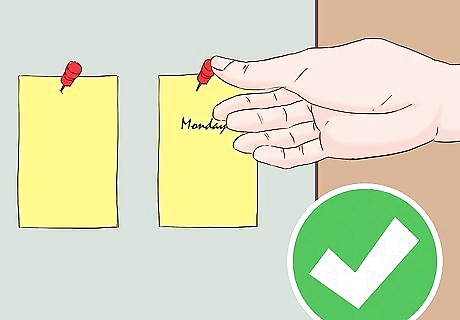
views
Focusing on a Project

Create a timeline to keep your project moving. Make a list of the tasks to be completed, the dates they need to be finished, and how long each task should take. Use this information to create a rough timeline for you to adhere to while you work. This timeline will keep you on track for your project even when you don’t have any expectations to motivate you. Make sure to take breaks into account when making your timeline. Regular short breaks during work help you maintain better focus and prevent burnout. Block out a little extra time for each task beyond what you think is necessary. That way, you will be prepared for unforeseen distractions, changes, or complications. Keeping a personal calendar can help you stay on track of your timeline. Mark off important days so you know you’re staying on course.

Set goals that are not tied to an outcome. Just because you’ve removed expectations about winning a specific prize or coming out first doesn’t mean you cannot set project goals. Consider the factors within your control, such as the work timeline, the project’s focus, or people you’ll be collaborating with. Set concrete goals, so even if you come up short in a formal estimation, you’ll have succeeded on your own terms. For a science experiment, you might make it your goal to collect data from at least 50 people. For a slideshow, you might make it your goal to create at least 10 slides. It may help to identify why these goals are important to you and the project. Write down your goals and why they are significant to you. Setting goals can help you achieve things like gaining experience, developing your skills, and building work relationships.

Embrace standards rather than expectations. Focus on achieving a high standard with your work, rather than hoping for a certain accolade. Standards, like goals, are within your control even if the outcome is not. Whether it’s a term paper with flawless grammar or a 100-yard sprint with perfect form, work hard at polishing your skills to be technically excellent. Take a moment now and then to assess how far you’ve come in honing your skills and improving your work. Make note of specific accomplishments and improvements. Fine-tuning your skills to a high standard is a reward in itself because you’ll likely improve in the estimation of others over time.
Staying Motivated

Follow your passions. Seek out what truly interests you, whether it’s choosing a cool sport you want to try out for at school or changing careers to work in a field you love. Doing things you enjoy can help you stay engaged while working hard. By focusing your energy on areas you already like, you’re more likely to stick with it when the going gets tough.

Live in the present moment. Stay motivated by not getting caught up with future events. Focusing on your goals and high standards in the present moment will keep you engaged with your work on your own terms. One good way to stay more in the present is to practice mindfulness or meditation every day. Mindful meditation takes practice, so don’t get discouraged if you don’t get the hang of it right away.

Enlist other people for support. Rely on your friends and family to lift you up when things are hard. Moving forward with no expectations can feel both scary and difficult. You can spend some quality time with a loved one to decompress or even collaborate to make difficult work easier. Whatever method works for you, seek out people who can help you when you feel down and unmotivated. Make a list of people you know you can count on to help you get motivated, and call or text one of them if you need help getting back on track. Try not to rely on the same person all the time, since this may lead to burnout or cause you to feel as if you are a burden to that person.

Create a “Done” list at the end of the day. A “Done” list is very much like a “To Do” list, except that it consists of things you have already accomplished. Write down anything you got done during the day, whether it’s completing an important project or taking care of a minor errand you’d been putting off. These lists will help you feel fulfilled and motivated by making you focus on what you’re accomplishing, rather than fretting about all the things you haven’t done.

Reward yourself with activities you love along the way. Create small rewards for yourself as you complete steps of your project. Staying on track without the expectation of a specific trophy or prize can be difficult. Get a favorite ice cream cone for finishing a chapter of your book or go to see a movie with friends after a week of tennis practices, for example. Whatever your skills, keep yourself engaged by rewarding yourself with things you love as you work hard. Sometimes rewarding yourself can be as simple as sharing an accomplishment or small victory with other people in your life. Tell a friend or family member, or make a post on social media celebrating your accomplishment.

Take pride in your decisions. However things turn out from an objective point of view, remember how you met your goals and worked to a high standard. These are achievements that require discipline and improve your craft. If you only work to please yourself, rather than others, you will succeed every time.
Letting Go of Expectations

Identify faulty assumptions. Cast off assumptions about success that are not true or helpful to you. It can be helpful to examine the way you talk to yourself about a project to identify harmful ideas. One of the most dangerous assumptions is the idea that “winning,” or achieving some measurable amount of success, will make you happy. Finding fulfillment will be difficult if you are always trying to measure up to something out of your control. For example, it is untrue that your work on a project is only valuable if you win first prize. One judge’s opinion does not determine the value of your work.

Learn new things to expand your mind. Try to see learning as a reward when you work hard rather than trying to achieve a specific accolade. Doing this can help you let go of weighty expectations. Learning new things can open you up to new passions and teach you about the world around you.

Work for improvement. Strive to improve your skills simply for the sake of mastery rather than to fulfill certain expectations. Improving your skills can make you excel in your craft, whether it’s writing, dancing or teaching. You’ll feel happy with your progress as you get better and better.

Use rejection to explore other opportunities. Even when you work hard, things don’t always work out. By interpreting rejection as an opportunity to try new things, you can explore different fields and try new skills. Letting go of your expectations places less pressure on you to always be perfect.

Focus on gratitude. If you feel yourself struggling with disappointment or frustration over things you haven’t accomplished, take a moment to think about the good aspects of your life. Being grateful for the ways in which you are fortunate can help you let go of unrealistic expectations or criteria that you’ve set for yourself in terms of your sense of happiness, success, or self-worth.
















Comments
0 comment